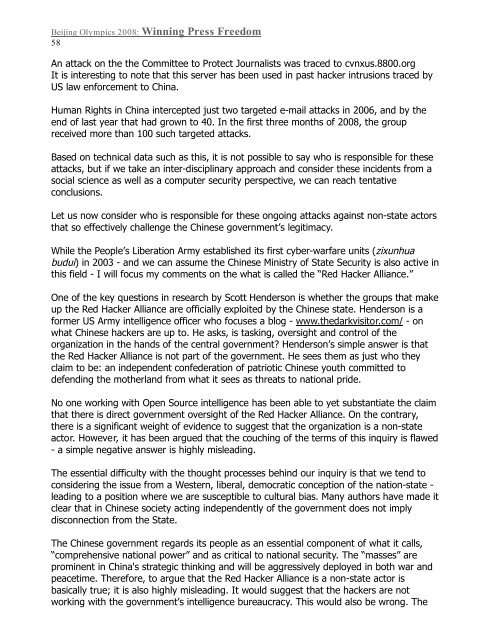Beijing Olympics 2008: Winning Press Freedom - World Press ...
Beijing Olympics 2008: Winning Press Freedom - World Press ...
Beijing Olympics 2008: Winning Press Freedom - World Press ...
You also want an ePaper? Increase the reach of your titles
YUMPU automatically turns print PDFs into web optimized ePapers that Google loves.
<strong>Beijing</strong> <strong>Olympics</strong> <strong>2008</strong>: <strong>Winning</strong> <strong>Press</strong> <strong>Freedom</strong><br />
58<br />
An attack on the the Committee to Protect Journalists was traced to cvnxus.8800.org<br />
It is interesting to note that this server has been used in past hacker intrusions traced by<br />
US law enforcement to China.<br />
Human Rights in China intercepted just two targeted e-mail attacks in 2006, and by the<br />
end of last year that had grown to 40. In the first three months of <strong>2008</strong>, the group<br />
received more than 100 such targeted attacks.<br />
Based on technical data such as this, it is not possible to say who is responsible for these<br />
attacks, but if we take an inter-disciplinary approach and consider these incidents from a<br />
social science as well as a computer security perspective, we can reach tentative<br />
conclusions.<br />
Let us now consider who is responsible for these ongoing attacks against non-state actors<br />
that so effectively challenge the Chinese government’s legitimacy.<br />
While the People’s Liberation Army established its first cyber-warfare units (zixunhua<br />
budui) in 2003 - and we can assume the Chinese Ministry of State Security is also active in<br />
this field - I will focus my comments on the what is called the “Red Hacker Alliance.”<br />
One of the key questions in research by Scott Henderson is whether the groups that make<br />
up the Red Hacker Alliance are officially exploited by the Chinese state. Henderson is a<br />
former US Army intelligence officer who focuses a blog - www.thedarkvisitor.com/ - on<br />
what Chinese hackers are up to. He asks, is tasking, oversight and control of the<br />
organization in the hands of the central government? Henderson’s simple answer is that<br />
the Red Hacker Alliance is not part of the government. He sees them as just who they<br />
claim to be: an independent confederation of patriotic Chinese youth committed to<br />
defending the motherland from what it sees as threats to national pride.<br />
No one working with Open Source intelligence has been able to yet substantiate the claim<br />
that there is direct government oversight of the Red Hacker Alliance. On the contrary,<br />
there is a significant weight of evidence to suggest that the organization is a non-state<br />
actor. However, it has been argued that the couching of the terms of this inquiry is flawed<br />
- a simple negative answer is highly misleading.<br />
The essential difficulty with the thought processes behind our inquiry is that we tend to<br />
considering the issue from a Western, liberal, democratic conception of the nation-state -<br />
leading to a position where we are susceptible to cultural bias. Many authors have made it<br />
clear that in Chinese society acting independently of the government does not imply<br />
disconnection from the State.<br />
The Chinese government regards its people as an essential component of what it calls,<br />
“comprehensive national power” and as critical to national security. The “masses” are<br />
prominent in China's strategic thinking and will be aggressively deployed in both war and<br />
peacetime. Therefore, to argue that the Red Hacker Alliance is a non-state actor is<br />
basically true; it is also highly misleading. It would suggest that the hackers are not<br />
working with the government’s intelligence bureaucracy. This would also be wrong. The





